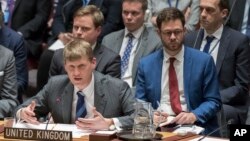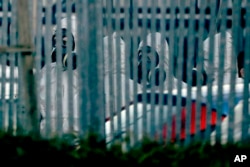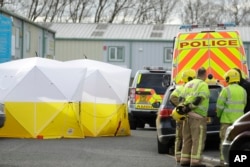Britain and Russia have been waging a fast and furious information war since former Russian spy Sergei Skripal and his daughter were found poisoned March 4 in the provincial English town of Salisbury.
Not a day has gone by without at least one fierce exchange between British and Russian officials — and both governments have turned to social media, from Twitter to Facebook, to make accusations and counter-claims in their efforts to convince a global audience of guilt or innocence.
And the barbs flying have been getting more personal. The British narrative has been more consistent, demanding an explanation from Moscow for why a Soviet-developed nerve agent, Novichok, was used to poison the Skripals and arguing the only plausible one is that the attempted assassination was sanctioned by the Russian government, a view endorsed by European Union leaders last week and by the U.S. government.
Russian officials have offered more than 20 different explanations about who might have been behind the nerve-agent poisoning of the Skripals or why Russia is innocent of the charge of being behind the assassination attempt. Western officials charge this changing of stories is designed to muddy the waters and sow doubt.
Russian explanations have ranged from claims the British might have done it themselves to accusations that the whole incident was made up. Kremlin officials have insinuated also that Sweden, Slovakia or the Czech Republic may be to blame, earning sharp rebukes from the governments of all three European countries. The Russian finger has pointed at Uzbekistan and Ukraine, too.
“The authorities of UK are not interested in finding the truth about the Skripal case, they have other motives,” lamented the Russian Mission to the United Nations on Twitter last week. “They are using propaganda war tools to influence an uninformed and impressionable public. There are no facts, only allegations about the 'Russian trace,’” the mission added.
On Saturday, the Russian emphasis returned once again to implying that Britain itself was behind the assassination bid, with officials noting that Porton Down, the British military research facility, is only about 10 miles from where the Skripals were discovered. The shifting Russian narratives give Moscow some advantages in the information war, say analysts.
“Russia feels free to say whatever it wants, it doesn’t feel need to tell truth, be consistent, or stick to any norms or rules,” says a communications strategist, who has worked for the British government. “These are handicaps in a battle like this,” he adds. Britain doesn’t have the same centralized, aggressive messaging machinery the Kremlin has, he notes.
Social media battle
Moscow has also launched an extensive social media-based disinformation campaign to buttress it claims of innocence as well as to press its accusations that London is in the grip of Russophobia, say Western analysts.
“Twitter has become a battleground,” says Ben Nimmo, an analyst with the Digital Forensic Research Lab at the Atlantic Council, a New York-based think tank. Supporters and defenders of the Russian government have clashed over who was to blame, and which side to believe; politicians and diplomats have joined in on both sides with much of the invective ‘organic” and driven by angry users and officials, he says.
But Russia’s so-called troll factories have also been at work using fake and automated social media accounts able to spread rapidly memes and messages.
Atlantic Council researchers have been plotting the activity of accounts that have been used in other Kremlin disinformation campaigns — notably during the 2014 Russian annexation of Crimea and the downing of Malaysian Airlines flight MH17 over Ukraine. One tactic they have spotted is the large-scale amplification by Russia’s troll accounts of doubts or criticism posted by genuine British critics of the British government or conspiracy theorists in a bid to show that Britons did not believe Russian leader Vladimir Putin was behind the poisoning.
British officials estimate at least 2,800 robotic troll accounts have posted messages or re-tweets about the attempted assassination of the Skripals reaching at least 7.5 million people in Britain. Facebook also has witnessed a large volume of postings of English-language content produced by Russian state-owned media.
Russia’s Twitter campaign “shows the power which anonymous trolls with demonstrably falsified profiles continue to wield online,” says Nimmo.
British officials have sought to expose the methodology behind what they say is Russia’s online disinformation campaign, posting on social media sites last week a video mocking the shifting narratives their Russian rivals have offered for what happened to the Skripals.
Not that Britain’s information approach is receiving unblemished praise. On Saturday, a former British envoy to Moscow, Tony Brenton, said while he supported the actions taken by the British government over the Skripal poisoning, he worried the language use, especially by Britain foreign secretary Boris Johnson, who has compared Putin to Adolf Hitler, was “unnecessarily virulent.”
He told a British newspaper: “Obviously we have to react robustly and firmly to deal with the Skripal outrage, but at some point we are going to have to get back to doing business with Russia. We should certainly be taking action that minimizes the recurrence of [a similar] attack, but we should not be burning our bridges so much that we cannot re-establish lines of communication.”
There is also criticism of Johnson in the Russian capital from British expatriates who say his comparisons of Russia now with Nazi Germany of the 1930s and 1940s is deeply offensive, noting that the Great Patriotic War, as Russians describe the Second World War, is something people from across the spectrum here celebrate.







